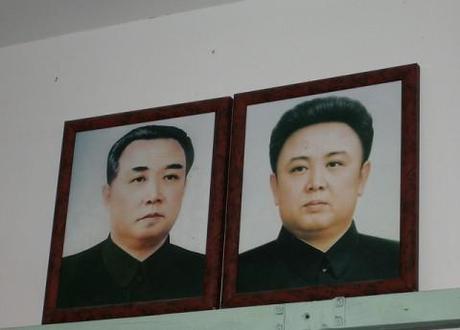
North Korean dynasty: Kim Il-sung and Kim Jong-il. Photo credit: skinnylawyer, http://flic.kr/p/9bXxsb
As North Korea’s deceased leader Kim Jong-il lies in state and a period of national mourning is declared, his son Kim Jong-un looks set to take over the reins of the isolated nation with nuclear capabilities. According to The Guardian, North Korean state media is already hailing Kim Jong-un as “the eternally immovable mental mainstay of the Korean people”.
But speculation is mounting around the world as to the twentysomething’s ability to take control and to fend off any potential challenges to his power from the ruling elite – not least because so little is known about him. It seems there may also be some concern within North Korea about the transition period, with The LA Times reporting that markets were shut down, trains were cancelled and residents of Pyongyang were urged to stay indoors: “The regime appeared to be taking no chances, quickly enacting rigid social controls, according to media reports.”
US Secretary of State Hillary Clinton called for a “peaceful and stable transition” in North Korea and expressed the hope that the country would improve relations with wealthy neighbor South Korea. But is this on the putative new North Korean leader’s agenda?
See the video below for footage from North Korean television of Kim Jong-il lying in state.
What we know about Kim Jong-un. Not a lot, although Adrian Chen at Gawker rounded up the scant information: Kim Jong-un is “an enigmatic basketball fanatic and four-star general with a bad case of fat cheeks and an itchy trigger finger”. According to Chen, the new North Korean leader was educated at a Swiss boarding school under a fake name, and his image was only released to the world last year. It seems Kim Jong-un also has a taste for shopping: “Last year, a train full of televisions and watches thought to be gifts for Kim was derailed on its way way from China,” wrote Chen.
Kim Jong-il’s eldest son, Kim Jong-nam, blew his chances of taking over as leader after being caught trying to sneak into Japan on a fake passport in 2001; apparently, he wanted to visit Disneyland Tokyo, reported The Independent.
Shy. The Washington Post’s Andrew Higgins provided a few more details, based on the suggestion that Kim Jong-un was “Pak Un”, a student enrolled at Liebefeld-Steinhölzli Schule in Switzerland, although neither Swiss nor North Korean authorities will confirm that this is the identity used by Kim Jong-il’s youngest son. Higgins reported that “Pak Un’s” classmates described him as shy but also fiercely competitive on the basketball court. Kim Jong-un’s Swiss education may prove key to his behavior as leader of North Korea: “Did it open his horizons beyond the narrow, xenophobic worldview of his homeland?” pondered Higgins.
The North Korean leadership question has prompted another foreign policy gaffe from Republican presidential hopeful Rick Perry, who referred to Kim Jong-il as “Kim Jong the Second”, reported The Telegraph.
What we don’t know. A lot – most significantly, how much leadership guidance he received from his father. Nicholas Eberstadt insisted at The Daily Beast that Kim Jong-il has failed to adequately prepare his son for power: “Kim Jong-il never troubled himself with the business of training a successor or helping him consolidate support.” Ebertstadt pointed to the possibility of a power struggle, given that Kim Jong-un’s aunt and uncle are now in positions of power: “In Korea’s long history there is a troubling tendency for regencies to end as regicides,” he wrote.
Power struggle unlikely – for now. ”The unified stance presented to the world suggests there will be no destabilising internal coup-making, at least for now,” wrote Simon Tisdall on The Guardian’s Comment is Free. However, Tisdall said that this is contingent on Kim Jong-un proving his authority – and the worry is that he may choose to do so by launching an attack on South Korea. According to Tisdall, China’s endorsement of Kim Jong-un is a good sign, as it shows North Korea’s only, and powerful, ally is keen to maintain stability in the region. But at the same time, said Tisdall, the endorsement also shows that China wants to maintain the status quo, which is at odds with the US hope of bringing North Korea out of isolation.

